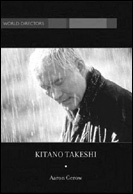Kitano Takeshi
by Tom Mes
Why has it taken so long for an authoritative study of Takeshi Kitano's work to appear in the English language? After all, ever since his arrival on the international circuit with Sonatine in 1993, the multi-talented Kitano has been regarded as pretty much the undisputed leader of a new generation of Japanese filmmakers, those who made their debuts at the dawn of the Heisei era. During much of the 1990s, he was the only active Japanese filmmaker whose name was known to even the most Hollywood-addled film periodicals.
In the intervening years, Kitano has racked up credibility points through his bow at the Cannes Film Festival with Kids Return in 1994, the Golden Lion for Hana-bi at Venice in 1997, an American co-production with Brother in 2000, and a Silver Lion, again at the Mostra, for best director for his entertaining revamping of Zatoichi in 2004.
The long-awaited publication of Kitano Takeshi, the first book-length study of the director's complete work, goes quite a ways to answering the question at the head of this review. Aaron Gerow - another man of incontestable credentials thanks to his stints teaching Japanese cinema at the University of Yokohama, Yale and his lengthy tenure as a film critic for the Daily Yomiuri - presents Kitano as an almost schizophrenic personality, made of two distinct personas: the director Takeshi Kitano and the comedian Beat Takeshi. Two personalities that are usually at odds, sometimes at war, and occasionally in harmony. Both straight man and buffoon, Kitano forms a one-man manzai act.
Gerow posits this duality as the key to analyzing and understanding Kitano's films. The opening chapter, entitled Introducing Two Takeshis, sets the stage, departing from a variety of opinions and attempts by other critics to pierce the mystery. In this chapter and throughout his book, the author makes ample reference to Japanese sources, which opens up a far wider reading of Kitano - one that includes the media personality Beat Takeshi of whom most westerners, including his fans and critics, still have only the slightest inkling, but which forms a crucial factor in understanding the man and his movies. At the same time, this use of Japanese sources also feels like an attempt to lay down new rules for the study of Japanese cinema by foreign critics and writers. A lack of knowledge of the language has meant that the biggest swath of existing discourses on Japanese film, namely that written by the Japanese themselves, is overlooked whenever Western critics talk about Japanese film.
In this regard, Gerow's detailed study sets a new standard, particularly when it comes to monographs of contemporary Japanese directors. While it could hardly be argued that Japanese critics have a monopoly on the 'truth' about their own filmmakers, incorporating their readings can only lead to more understanding and lower the risk of ethnocentric analysis and exoticism. Or just plain old missing the point.
In other areas too, Gerow gives little jolts to stale customs. His reading of Kitano as both artist and prankster results in a very cautious approach of auteurism. With Kitano, particularly in his post-Hana-bi period, constantly going off on tangents - from film to film but also sometimes within the same film - a classic search for recurring patterns and themes is bound to end in frustration. The clown Takeshi regularly rears his grinning head to sabotage the auteur Kitano's artistic pretenses, leaving audiences and critics scratching their heads over films like Getting Any, Kikujiro, and Brother - not to mention Takeshis' and Glory to the Filmmaker, two films in which the duel between Kitano and Takeshi takes center stage and which were almost unanimously dismissed.
Gerow's study does an admirable job at dissecting the slippery beast known as Takeshi Kitano, and this volume deserves to be seen as a benchmark for any future studies of contemporary Japanese filmmakers. However, the author's consistent reliance on references to other sources in building up his discourse results in his own personality remaining almost as elusive of that of the subject he so deftly dissects.
